The SSD Anthology: Understanding SSDs and New Drives from OCZ
by Anand Lal Shimpi on March 18, 2009 12:00 AM EST- Posted in
- Storage
PCMark Vantage
Next up is PCMark Vantage, another system-wide performance suite. For those of you who aren’t familiar with PCMark Vantage, it ends up being the most real-world-like hard drive test I can come up with. It runs things like application launches, file searches, web browsing, contacts searching, video playback, photo editing and other completely mundane but real-world tasks. I’ve described the benchmark in great detail before but if you’d like to read up on what it does in particular, take a look at Futuremark’s whitepaper on the benchmark; it’s not perfect, but it’s good enough to be a member of a comprehensive storage benchmark suite. Any performance impacts here would most likely be reflected in the real world.
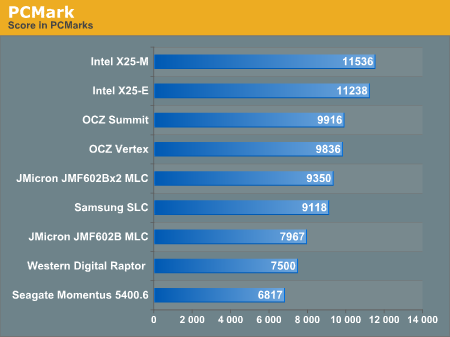
If you've paid attention to the synthetic tests from the previous pages, the results here should make sense. The Intel drives take the top two spots followed by the two OCZ drives, then the JMicron and conventional HDDs take up the rear.
While PCMark does do a great job of measuring disk performance, it doesn't seem to stress random write performance as much, allowing the JMicron drives to relax a bit.
Now let's look at the individual test suites:
The memories suite includes a test involving importing pictures into Windows Photo Gallery and editing them, a fairly benign task that easily falls into the category of being very influenced by disk performance.
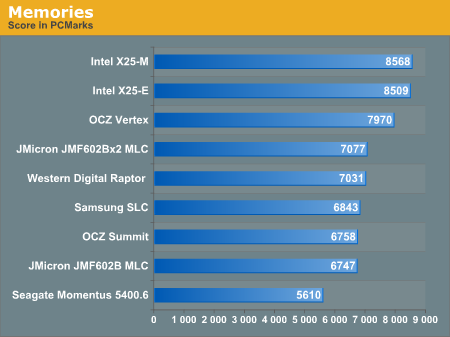
The TV and Movies tests focus on on video transcoding which is mostly CPU bound, but one of the tests involves Windows Media Center which tends to be disk bound.
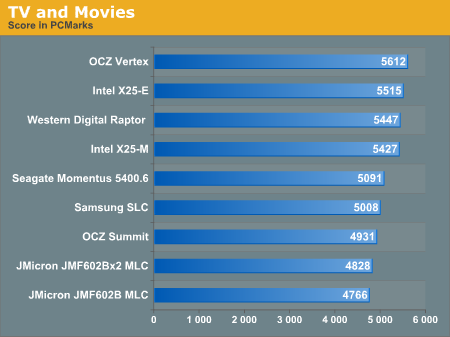
SSDs won't always dominate and in many cases they won't offer tangible improvements over a fast hard drive.
The gaming tests are very well suited to SSDs since they spend a good portion of their time focusing on reading textures and loading level data. All of the SSDs dominate here, but as you'll see later on in my gaming tests the benefits of an SSD really vary depending on the game. Take these results as a best case scenario of what can happen, not the norm.
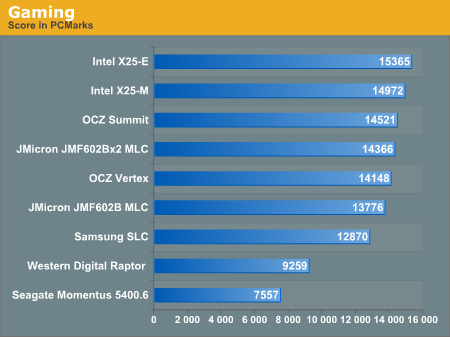
In the Music suite the main test is a multitasking scenario: the test simulates surfing the web in IE7, transcoding an audio file and adding music to Windows Media Player (the most disk intensive portion of the test).
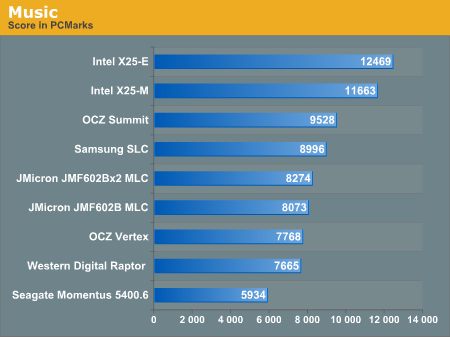
The Communications suite is made up of two tests, both involving light multitasking. The first test simulates data encryption/decryption while running message rules in Windows Mail. The second test simulates web surfing (including opening/closing tabs) in IE7, data decryption and running Windows Defender.

I love PCMark's Productivity test; in this test there are four tasks going on at once, searching through Windows contacts, searching through Windows Mail, browsing multiple webpages in IE7 and loading applications. This is as real world of a scenario as you get and it happens to be representative of one of the most frustrating HDD usage models - trying to do multiple things at once. There's nothing more annoying than trying to launch a simple application while you're doing other things in the background and have the load take seemingly forever.
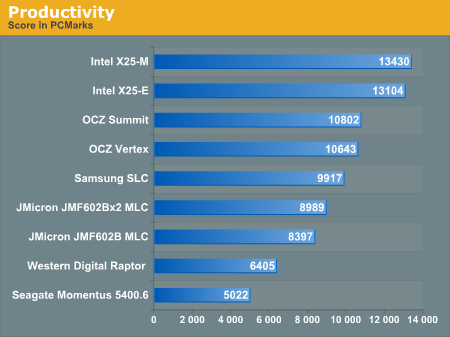
The results here are the best characterization of my personal experience with the drives. The Intel drives are the fastest, a good 25% faster than the Summit or Vertex. Next up are the OCZ drives, with the Vertex dangerously close to the Summit. The older Samsung SLC is next in the standings, followed by the JMicron drives. There's a healthy combination of reads and writes going on here which benefits all of the SSDs, including the less desirable ones.
The final PCMark Vantage suite is HDD specific and this is where you'll see the biggest differences between the drives:
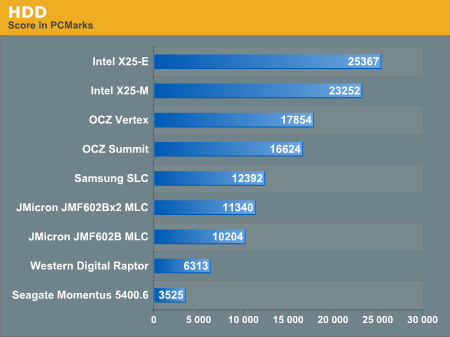
Again we're seeing the sort of breakdown we'd expect. The Intel drives come out ahead, while the Vertex is the best bang for your buck.










250 Comments
View All Comments
Luddite - Friday, March 20, 2009 - link
So even with the TRIM command, when working with large files, say, in photoshop and saving multiple layers, the performance will stil drop off?proviewIT - Thursday, March 19, 2009 - link
I bought a Vertex 120GB and it is NOT working on my Nvidia chipsets motherboard. Anyone met the same problem? I tried intel chipsets motherboard and seems ok.I used HDtach to test the read/write performance 4 days ago, wow, it was amazing. 160MB/s in write. But today I felt it slower and used HDtach to test again, it downs to single digit MB per second. Can I recover it or I need to return it?
kmmatney - Thursday, March 19, 2009 - link
Based on the results and price, I would say that the OCZ Vertex deserves a Editor's choice of some sort (Gold, Silver)...Tattered87 - Thursday, March 19, 2009 - link
While I must admit I skipped over some of the more technical bits where SSD was explained in detail, I read the summaries and I've gotta admit this article was extremely helpful. I've been wanting to get one of these for a long time now but they've seemed too infantile in technological terms to put such a hefty investment in, until now.After reading about OCZ's response to you and how they've stepped it up and are willing to cut unimportant statistics in favor of lower latencies, I actually decided to purchase one myself. Figured I might as well show my appreciation to OCZ by grabbing up a 60GB SSD, not to mention it looks like it's by far the best purchase I can make SSD-wise for $200.
Thanks for the awesome article, was a fun read, that's for sure.
bsoft16384 - Thursday, March 19, 2009 - link
Anand, I don't want to sound too negative in my comments. While I wouldn't call them unusable, there's no doubt that the random write performance of the JMicron SSDs sucks. I'm glad that you're actually running random I/O tests when so many other websites just run HDTune and call it a day.That X25-M for $340 is looking mighty tempting, though.
MrSpadge - Thursday, March 19, 2009 - link
Hi,first: great article, thanks to Anand and OCZ!
Something crossed my mind when I saw the firmware-based trade-off between random writes and sequential transfer rates: couldn't that be adjusted dynamically to get the best of both worlds? Default to the current behaviour but switch into something resembling te old one when extensive sequential transfers are detected?
Of course this neccesiates that the processor would be able to handle additional load and that the firmware changes don't involve permanent changes in the organization of the data.
Maybe the OCZ-Team already thought about this and maybe nobody's going to read this post, buried deep within the comments..
MrS
Per Hansson - Thursday, March 19, 2009 - link
Great work on the review AnandI really enjoyed reading it and learning from it
Will there be any tests of the old timers like Mtron etc?
tomoyo - Thursday, March 19, 2009 - link
That was kind of strange to me too. But I assume Anand really means the desktop market, not the server storage/business market. Since it's highly doubtful that the general consumer will spend many times as much money for 15k SAS drives.Gary Key - Thursday, March 19, 2009 - link
The intent was based it being the fastest for a consumer based desktop drive, the text has been updated to reflect that fact.tomoyo - Thursday, March 19, 2009 - link
I've always been someone who wants real clarify and truth to the information on the internet. That's a problem because probably 90% of things are not. But Anand is one man I feel a lot of trust for because of great and complete articles such as this. This is truly the first time that I feel like I really understand what goes into ssd performance and why it can be good or bad. Thank you so much for being the most inciteful voice in the hardware community. And keep fighting those damn manufacturers who are scared of the facts getting in the way of their 200MB/s marketing bs.